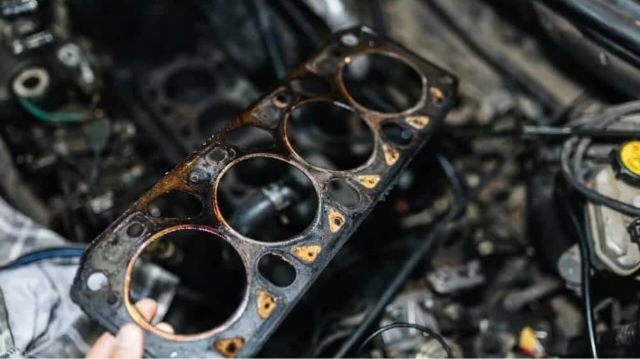A blown head gasket is one of the most serious issues that can happen to a car's engine. While the term may sound technical, it is essential to understand what a head gasket is, how it affects your engine, and the common reasons behind its failure. In this article, we'll explain how a blown head gasket can harm your engine and what you can do to prevent it.
Symptoms of a Blown Head Gasket
When a head gasket blows, the symptoms become noticeable fairly quickly. Here are some common signs that your vehicle might have a blown head gasket.
- Overheating: A blown head gasket causes coolant leaks, which can make your engine overheat quickly.
- White Smoke: If you see white smoke coming from the exhaust, it likely means coolant is burning in the engine due to a blown head gasket.
- Loss of Power: Your car may struggle to accelerate or show a decrease in power if the head gasket is damaged.
- Bubbling in the Radiator: Bubbles in the coolant can be a sign of exhaust gases leaking into the cooling system.
If you notice any of these signs, you should seek professional help immediately to prevent further damage.
How Does a Blown Head Gasket Affect Engine Performance?
A blown head gasket can drastically reduce your engine's performance. Here are some ways it affects how your engine works.
- Loss of Compression: The head gasket ensures that the combustion chambers are sealed tightly. A blown gasket can cause a loss of compression, leading to poor engine performance and reduced power.
- Overheating: Without the proper seal, coolant can leak out of the engine, causing it to overheat. An overheated engine can suffer from serious damage, such as warped metal parts or a seized engine.
- Oil Contamination: A blown head gasket can allow coolant to leak into the oil, contaminating it. This reduces the oil's ability to lubricate engine parts, leading to increased wear and tear.
- Engine Misfires: A blown gasket can allow gases to escape the cylinders, causing the engine to misfire. Misfires result in poor acceleration and can lead to engine failure if left untreated.
The performance of your car depends heavily on how well the engine runs. A blown head gasket can lead to major issues that affect your daily driving experience.
What Is a Head Gasket and Its Importance?
A head gasket is a crucial part of your car's engine. It sits between the engine block and the cylinder head, ensuring that the combustion chambers remain sealed.
The gasket helps prevent the mixing of coolant and oil while also maintaining the necessary compression for the engine to run efficiently. When the gasket works as it should, the engine performs at its best. However, when it fails, the engine can experience several problems.
Why Do Headgaskets Fail?
Understanding Why Do Headgaskets Fail? can help prevent these issues from occurring. Here are some of the common reasons for head gasket failure.
- Overheating: One of the leading causes of head gasket failure is overheating. When the engine gets too hot, it can cause the gasket to warp and fail.
- Poor Quality Parts: Low-quality head gaskets or improper installation can lead to premature failure. It's important to use high-quality parts when replacing the gasket.
- Wear and Tear: Over time, your car's engine undergoes wear and tear. This can increase the chances of the head gasket failing, especially in older cars.
- Excessive Engine Pressure: If the engine's internal pressure gets too high, it can damage the head gasket. This is often a result of poor maintenance or neglecting repairs.
By understanding these reasons, car owners can take steps to avoid the damage caused by a blown head gasket.
How to Prevent a Blown Head Gasket?
Preventing a blown head gasket requires regular maintenance and awareness. Follow these tips to help avoid costly repairs.
- Keep Coolant Levels in Check: Always ensure your coolant levels are correct. Low coolant can lead to overheating and damage the head gasket.
- Monitor Engine Temperature: Keep an eye on the engine temperature gauge. If it begins to overheat, turn off the engine to avoid serious damage.
- Use Quality Parts: When replacing a head gasket, use high-quality parts. Cheap parts are more likely to fail prematurely.
- Regular Engine Inspections: Regularly check your engine for signs of wear, leaks, or unusual behavior. Early detection can prevent bigger problems.
- Avoid Overloading the Engine: Driving aggressively or overloading the engine can increase pressure, which can cause the head gasket to fail.
By staying on top of these preventative measures, you can avoid many of the common causes of head gasket failure.
Conclusion
A blown head gasket is a serious issue that can affect your car's performance and lead to expensive repairs. Recognizing the symptoms, understanding how it affects engine performance, and knowing the reasons behind head gasket failure can help you act quickly to prevent further damage.
If you're wondering why do headgaskets fail?, it's usually due to overheating, poor-quality parts, or engine wear and tear. By staying informed and taking care of your engine, you can avoid the common causes and keep your car running smoothly for years to come.






